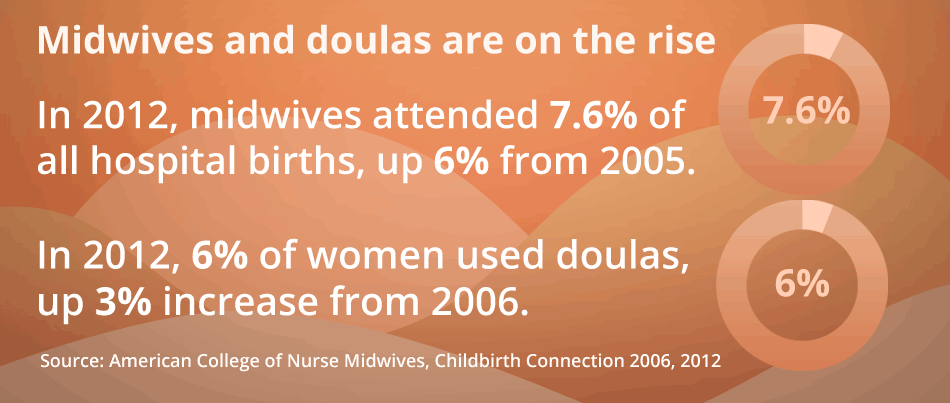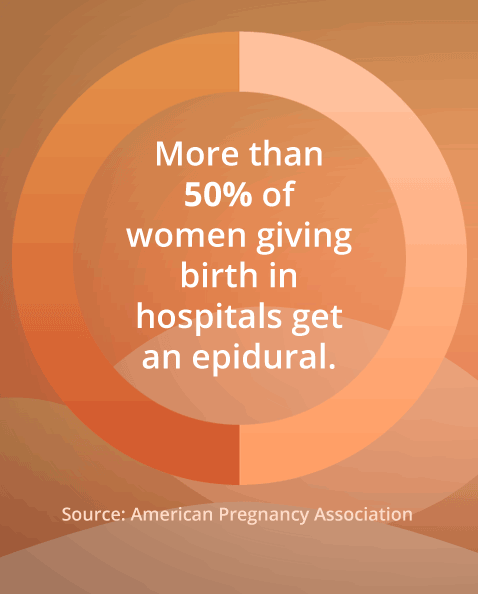Labor and delivery are the last steps before you can meet your new little one. And while the goal of labor is the same”delivering a healthy baby and keeping mom safe”the options for managing labor pains can vary.
First, here are two things to keep in mind when making decisions about how to deal with labor pains:
- Know your options ahead of time. Your thoughts about which method is right for you may change once labor begins, especially if this is your first pregnancy. So, it's best to know all that's available.
- Every woman's experience with labor pains is different. Tune into your body and your needs. And tune out any pressure you're feeling from others to do something you're not comfortable with, unless there's a medical need.
Midwife or Doula Could Increase Chances of a Natural Birth
If you decide to go drug-free during labor, consider hiring a doula or a midwife.

Source:American College of Nurse Midwives, Childbirth Connection 2006,2012
Your relationship with a doula or certified professional midwife starts during pregnancy and can extend after labor into postpartum care.
Both are experienced in pregnancy and natural birthing. Their role is to educate, counsel, and help women make informed decisions about pregnancy and labor.
The main difference between the two is the credentials.
Certified Professional Midwives are licensed professionals, according to the National Association of Certified Professional Midwives. They can provide medical care, like performing ultrasounds, pregnancy check ups, and can even deliver your baby.
Doulas are experienced in caring for women during pregnancy, according to the American Pregnancy Association. However they're not licensed medical professionals, so they can't deliver your baby, perform ultrasounds, or do medical check ups.

Source:Cochran Database System of Review, July 2013
Natural Pain Relief Methods
The great thing about natural options is that you don't have to pick just one. You can try several options during labor to see which works best when the contractions hit. Talk to your maternity care team about the following techniques:
- Breathing is a simple way to connect your mind and body. When your body is in pain, it tenses up in reaction to the pain. Focusing on your breath can help your mind and body relax during labor pain, according to the American Pregnancy Association.
- Meditation or hypnosis, if done right, can put laboring moms into a deeply relaxing state. The idea is to use soothing visuals or thoughts to relieve anxiety and discomfort so your muscles can do their job, says the American Pregnancy Association.
- Warm water can provide comfort and relaxation during labor, according to the American Pregnancy Association. Some women choose to recline in the bathtub or a birthing tub, while others take warm showers to find relief. If you want to try a birthing tub, be sure to make arrangements with your labor team ahead of time.
- Changing positions during labor can ease pain. It can also move the labor along by opening up the pelvis and taking advantage of gravity. A birthing ball can be used to move into different positions. Examples of positions can be seen in the video below from Tammy Ferney, RN and Clinical Educator at EIRMC.
- Massages from a doula, midwife, or spouse can alleviate pain during labor. Laboring women who had massages to manage labor pain experienced significantly less pain and had shorter labors”an average of 3 hours shorter, reported a March 2010 study in Expert Review of Obstetrics & Gynecology.
Medicated Pain Relief
If during labor you decide the pain is too much to bear with these natural methods, that's fine. You have the option to choose an epidural.

Source: American Pregnancy Association
An epidural is one of the most common drugs used to manage labor pains for vaginal and cesarean births. They are administered by anesthesiologists to dull all sensation below the waist.
This means that once you get an epidural, you won't be able to get out of bed. Not even to use the bathroom. So, your maternity care team may have to insert a catheter for you to urinate.
Whether you choose natural or medicated pain relief, remember the end goal is the same”healthy mom and healthy baby. The maternity care team at EIRMC can help you with that.
$webqFacilityNumber
Need a Physician?